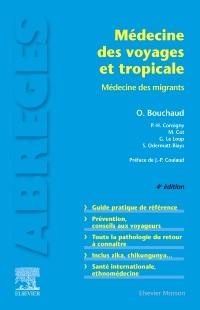All travelers can come into contact with health risks that are completely different from those they generally encounter on a daily basis. So it is vital to prepare thoroughly for any trip – and that involves consulting a specialist travel clinic such as the Institut Pasteur Medical Center (CMIP).
Travel is a formative experience for young people – and young people often take a casual attitude to life. But that's no excuse to apply the same easygoing, carefree attitude to health when traveling abroad – especially because travelers can come into contact with health risks that are completely different from those they generally encounter on a daily basis. If they want to return from their trip in the same state of health as when they left, it is vital to prepare thoroughly – and that involves consulting a specialist travel clinic, regardless of the destination! Contrary to popular belief, health risks are not restricted to "exotic" destinations. Few people are aware, for example, that in a country like Austria, which has both large swathes of woodland with hiking trails and wooded parks in cities like Vienna, these areas are inhabited by ticks that may transmit a dangerous illness, tick-borne encephalitis (TBE). Since TBE is found in all of Eastern Europe, from Alsace to Siberia, it may be a good idea to get vaccinated if you are planning to stay there for any length of time.
From epidemiological surveillance to advice for travelers
"Travel medicine is a bit like a filter," explains Dr. Paul-Henri Consigny, Director of the Institut Pasteur Medical Center (CMIP). "It shows travelers how their state of health is likely to stand up to the health conditions they may encounter while traveling, with the aim of making sure they are fit for the trip they are planning and determining any preventive measures – or advising against traveling at all." Travel medicine specialists therefore need to carry out epidemiological surveillance on a regular basis to make sure they are fully up to date with the risks for each destination. Given the Institut Pasteur's role in monitoring emerging diseases, for example, it was able to make a major contribution to raising public awareness during the 2006-2007 Indian Ocean outbreak of chikungunya, then a relatively unknown disease.
Travel medicine specialists also have a detailed knowledge of all the diseases travelers may encounter, and especially their symptoms. This expertise is vital for returning travelers: "A doctor with little knowledge of tropical diseases could fail to recognize a case of malaria contracted while abroad, since the first symptoms can resemble a flu-like illness," confirms Paul-Henri Consigny.
The disease fact sheet about COVID-19, caused by novel coronavirus
Finally, travel medicine emphasizes the importance of an often-neglected issue, namely the responsibility of travelers towards the country they are traveling to. While it goes without saying that travelers should do all they can to avoid bringing a disease back with them, it is just as important for them not to take diseases to the regions they are visiting – or there may be dramatic consequences. The Samoan Islands, where vaccine coverage is low, recently experienced a measles outbreak that claimed dozens of lives because of a virus imported by a tourist from New Zealand.
A traveler's health checklist
Before setting off
- Make sure you are up to date with the vaccines in the French vaccination schedule.
- Get the recommended vaccinations for your chosen destination, whether they are compulsory or not.
- Familiarize yourself with best hygiene practices and health risks you may encounter during your travels – especially malaria, for which preventive medication may be prescribed.
- For all of the above, consult a specialist travel medicine center like the Institut Pasteur Medical Center.
When you get back
- Make an appointment with a specialist medical center if you observe any symptoms after you get back, even if they seem mild, to ensure you have not contracted a disease that may be dangerous or trigger an outbreak. Recently, for example, there have been cases of Zika transmission by tiger mosquitoes (now present in some regions of France) after they bit tourists in France who had contracted Zika during their travels.
- While traveling
Wash your hands regularly to avoid bacterial, viral or parasitic contamination. Keep a close eye on food hygiene. Protect yourself against animals that may transmit disease (especially mosquitoes). Comply with specific recommendations for your chosen activities (trekking, diving, etc.) or practices (sexually transmitted diseases, etc.).
Find out more about travel medicine
The fourth edition of the book Médecine des voyages et tropicale ("Travel and tropical medicine", in French), published by Elsevier in September 2019, contains a wealth of important practical information for preparing a trip abroad. It also contains detailed disease fact sheets and a guide for physicians treating patients with symptoms of tropical diseases. The book is co-authored by Dr. Paul-Henri Consigny, an infectious and tropical disease specialist and Director of the CMIP.







